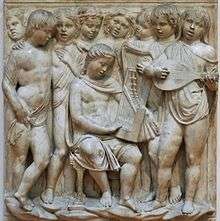Psalm 150
Psalm 150 is a psalm in the Hebrew Bible/Old Testament. In it, the writer urges the congregation to praise God with music and dancing. The text, beloved by Jews and Christians alike, has often been set to music. The basic concept of this psalm is that there are a variety of ways one can praise God.[1]
Uses
In Judaism
A long tradition ascribes authorship of Psalms 150 to King David.
- Together with Psalms 146, 147, 148 and 149, Psalm 150 is recited as a part of daily prayer during Pesukei D'Zimrah. They are considered an alternate form of Hallel, and their recitation is considered to be reciting Hallel daily.
- Verse 3 if found in the repetition of the Shacharit Amidah on Rosh Hashanah.[2]
- Verses 1-6 are found in the Mussaf Amidah on Rosh Hashanah.[3]
- Psalm 150 is the tenth of ten Psalms recited in the Tikkun HaKlali of Rebbe Nachman of Breslov
In Christianity
It is one of the Laudate psalms and was sung as part of a trio of psalms during Lauds in the Roman rite.
In the New King James Version, Psalm 150 is translated into English as follows:
Let All Things Praise the LORD
1 Praise the LORD!
Praise God in His sanctuary;
Praise Him in His mighty firmament!
2 Praise Him for His mighty acts;
Praise Him according to His excellent greatness!
3 Praise Him with the sound of the trumpet;
Praise Him with the lute and harp!
4 Praise Him with the timbrel and dance;
Praise Him with stringed instruments and flutes!
5 Praise Him with loud cymbals;
Praise Him with clashing cymbals!
6 Let everything that has breath praise the LORD.
Praise the LORD!
Musical settings

- Ernani Aguiar - Salmo 150[4]
- Johann Sebastian Bach, motet Singet dem Herrn ein neues Lied
- Anton Bruckner—Psalm 150 Halleluja. Lobet den Herrn in seinem Heiligthum WAB 38 (1892)[5]
- Felix Mendelssohn Bartholdy - citation in Lobgesang ("Symphonie-Kantate") Op. 52 ("Alles, was Odem hat, lobe den Herrn.")
- Charles Ives - Psalm 150
- Cesar Franck - Psalm 150
- Zoltán Kodály - Geneva Psalm 150
- Louis Lewandowski - Halleluyah (Psalm 150)
- Edmund Rubbra – Three Psalms, op.61 (no.3)
- Charles Villiers Stanford - Psalm 150: O praise God in his holiness
- Igor Stravinsky - Symphony of Psalms - Third Movement
- Duke Ellington - "Praise God and Dance" in the Second Sacred Concert
- Jimmy Webb - "Psalm One-Five-O" on Words and Music
- P.O.D. - "Psalm 150" on The Fundamental Elements of Southtown
- J. Moss - "Psalm 150" on The J Moss Project
- Ronald Corp - Psalm 150, O Praise God in His Holiness (2007). He also set the Latin version of the same text in Laudate Dominum (2011)
- Karl Jenkins in Gloria (Jenkins), movement 3 Tellihim, Psalm 150 in Hebrew (or Latin), 2010
- VaShawn Mitchell - "Psalm 150" on Created4This
References
- ↑ Isaacs, Ronald H. Every Person's Guide to Jewish Prayer, p.115.
- ↑ The Complete Artscroll Machzor for Rosh Hashanah, p.324.
- ↑ The Complete Artscroll Machzor for Rosh Hashanah, p.465.
- ↑ http://earthsongschoralmusic.com/index.php?main_page=product_sheet_music_info&cPath=1_8_5&products_id=2289
- ↑ Grasberger, Franz. Rickett, Richard, translator. "Foreword", Anton Bruckner: Sämtliche Werke: Band 20 Teil 6: Psalm 150: Studienpartitur, Musikwissenschaftlicher Verlag der Internationalen Bruckner-Gesellschaft, Vienna, 1964.
External links
- Hebrew text, translation, transliteration, recorded melodies in the Zemirot Database